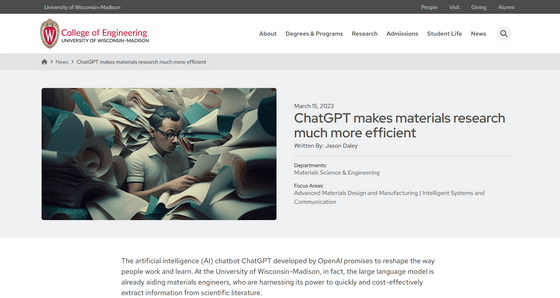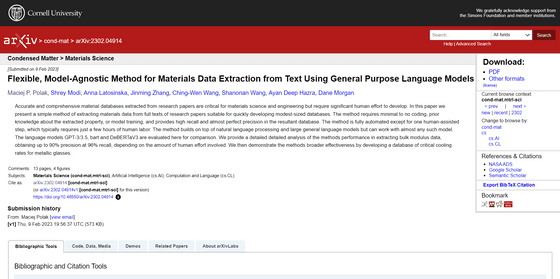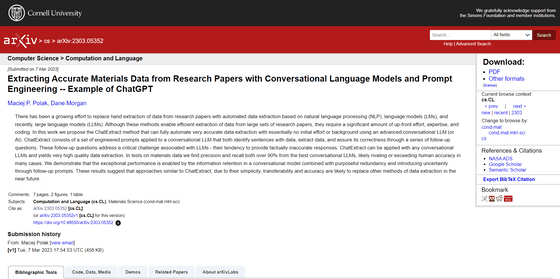'ChatGPT reduced the time and effort of reading papers by 99%,' says a scientist, how is AI used in the laboratory?

In addition to
Chat GPT makes materials research much more efficient
https://engineering.wisc.edu/news/chatgpt-makes-materials-research-much-more-efficient/

“AI is increasingly able to help with highly complex and time-consuming tasks,” says Dane Morgan, professor of materials science and engineering at the University of Wisconsin-Madison, and his fellow staff scientist. Mr. Maciej Pollack.
After brainstorming whether AI could be used to streamline their research, they came up with the idea of using ChatGPT to help materials scientists like Morgan struggle to read papers and obtain data. rice field.

According to Pollack, materials scientists often download and read long research papers just to add a few numbers to the dataset. Therefore, we decided to entrust such time-consuming work to AI, which is good at reading papers and providing information.
But no matter how powerful ChatGPT is, asking it to find and extract data from full-text articles is still too heavy. So Pollack asked ChatGPT to go through each sentence and determine if it contained the data he wanted, and then instructed it to output the data in a tabular format. This way, a human scientist can look at the tables and sentences and check that they are extracting relevant data.
This technique boasts an accuracy of about 90%, and Mr. Pollack and others succeeded in building a database of the critical cooling rate of metallic glasses using ChatGPT. Mr. Pollack and others have published this result on the preprint server arXiv.
[2302.04914] Flexible, Model-Agnostic Method for Materials Data Extraction from Text Using General Purpose Language Models

Pollack et al., who were able to reduce the time and effort of reading papers by 99% with AI, worked on the following methods to further improve accuracy and complete automation. That is '
Mr. Morgan commented on his impression of working on this prompt engineering, saying, 'At first, I felt that there was a strange way to do it. This is not traditional programming, and the method of interacting with AI is human Because it was more like words, having an AI extract data and look at plain text to make sure it's okay is less like how I normally train a computer to teach a kid to come up with the right answer. I thought it was close to ',' he recalls.
Using prompt engineering, the research team devised a series of questions to make the AI review the data extracted by the AI and find possible mistakes. By repeatedly double-checking the data, ChatGPT was able to identify the wrong data in almost all cases.
This method, named 'ChatExtract', has succeeded in achieving a precision and recall rate of 90% or more, which in most cases is comparable to humans or may exceed humans. Mr. Pollack and Mr. Morgan have also summarized this in a paper and published it in March 2023.
[2303.05352] Extracting Accurate Materials Data from Research Papers with Conversational Language Models and Prompt Engineering -- Example of ChatGPT
https://doi.org/10.48550/arXiv.2303.05352

``The most important thing is that AI can identify incorrect data,'' Pollack said of ChatExtract. It's also important that it doesn't require a lot of pain or deep knowledge - in the past you would have had to write hundreds of lines of code to do something like this, and the result was not very good. But now, with tools like ChatGPT, that ability has greatly improved.”
Morgan believes AI will not replace graduate students, scientists and other researchers. Rather, by using a tool called AI, researchers will be able to proceed with projects that could not be done due to lack of time, funds, and personnel.
Regarding the future of AI and science, Morgan said, ``In the past, we searched for papers and materials on Google and other search tools, read them, and extracted data to conduct research in specific fields. But now you can use large language models to gather information about something and use techniques like the one we developed to build a database within hours. AI has made it possible to collect information that could lead to delays in research or the direction of research being lost.'
Related Posts:
in Science, Posted by log1l_ks







